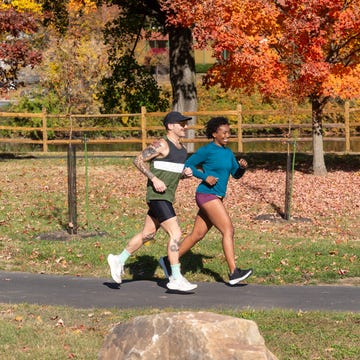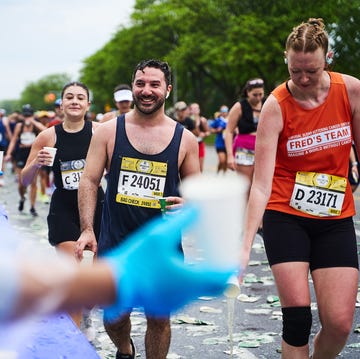How do we reach our potential, or find our way to that next PR?
At first, it seems straightforward: care more. If we can move it from a hobby to a passion, we’ll start training more and doing the little things we need to improve. We start setting goals. Aiming to eke out a few more seconds off of our half marathon best. We move from running as something we do, to it being a part of who we are. We shift from from “I like to run” to “I am a runner.” In that process, success becomes personal and important. And with that jump, inevitably comes a breakthrough in performance. But in my coaching career and in researching my new book Win the Inside Game, I noticed a paradox. The thing that fuels our initial rise is often what gets in the way. When progress slows, doubling down on the work often backfires. We need to go the other way.
Sara Hall has always been a competitor. She was a high school phenom, winning the Foot Locker national cross-country championships her senior year. She followed it up with a brilliant career at Stanford, where she was a three-time NCAA runner-up. In her professional career, she steadily improved, always a presence on the national level. She’d always set audacious goals, gunning for big PRs, and finishing among the best. And she’d done well. Yet, in the middle of her career, she was stuck, never quite making that jump to among the best in the world.
In 2021, in the midst of the global pandemic and at an age when many athletes are on the downswing of their career, Sara had the breakthrough she’d long sought. She finished second in one of the most competitive races in the world, the London Marathon. The only person who beat her? The then-world record holder. But she didn’t get there by targeting the outcome. She went the other way. After her breakthrough race, she said, “When you’re secure in your identity you can celebrate others’ successes and let them inspire you instead of threaten you.” When pressed on how she became secure, she replied, “It took lots of failure. Then, realizing I had built an identity around success. I had to realize I’m not what I do [and] learn I was worthy of love no matter what.”
A little more than a year later, at age 38, with mounting expectations, and a target of the American record in the half marathon in Houston, she once again let go. She and her husband/coach, Ryan, put the record on the backburner. “We decided instead, the goal wasn’t a time but the feeling… Flying along, stride fluid, flanked by amazing women, loving finally getting a cold day.” As Hall explained after the race, “Sometimes you have to reframe your goal, because I never want to have a goal that’s stealing my peace, ripping me out of the present and keeping me from loving the people in my life well.” She broke the American record. In the years since, she’s continued her success, including twice setting the American masters record in the marathon in 2024. She ran faster by letting go.
We often think that path toward success, of being a good competitor, is some version of locking in on big scary goals, and doing whatever we can to get there. But Sara’s story points in another direction. A hyper focus on results is often constraining. The goal written in your training log moves from motivating to being an anxiety-inducing reminder that you might fall short. Races shift from an exploration of what you’re capable of, to a kind of proving ground. The goals, objectives, and outcomes get in the way. We care so much, that we move from striving to protecting.
Science backs this up. When we over-index on the results, when success or failure becomes self-defining, we move from seeing the race as challenge to a threat. When we have to win, psychologists found that we more likely to self-sabotage, to come up with excuses, or blame the ref. Because the results are intertwined with their sense of self, their brain defaults to doing whatever they can to protect their self-worth. There’s a fine line between caring deeply and too much. And when everything around us, from social media to Strava, is telling us that the results matter a lot, our brain gets the message. We start to treat it like our self is on the line. Overwhelming expectations, pressure, and anxiety soon follow.
The secret to getting that breakthrough is to take a page out of Hall’s book, free yourself up to perform. Let’s look at four practical ways to do so.
Throw the Watch Away
In 2017, researchers coined a new condition that was on the rise, “orthosomnia.” It’s when tracking your sleep becomes so much of an obsession that doing so gets in the way of getting high-quality sleep. The tracker that’s supposed to help you rest instead creates anxiety that prevents you from achieving that goal. I’d bet a similar condition exists for runners and performance metrics. We’ve all felt it—the anxiety surging through our body as we check a mile split and see it be a touch slower than we expected. Rumination and catastrophizing soon follow. We get locked in a doom loop of negativity and, before we know it, our race is over. Watches can be great. But they need to be informational, giving you feedback that can guide your decisions. If the watch starts to be a dictator, shifting your feelings and thoughts, it’s time to change that relationship.
That could mean in training working on being non-reactive to your mile splits, to teach your mind to accept them for what they are and go with it. Or it could mean in a racing situation, throwing the watch away. That’s what Hall did at December’s Valencia Marathon, where she ran her U.S. masters record of 2:23:45. At mile 17, she decided the watch had served its purpose and was now getting in the way. She flung it into the crowd. Know when feedback is being helpful and when it’s getting in the way of focusing on what actually matters.
Move Your Goals From Simple to Complex
Goals serve a vital purpose. They act as motivators and reminders, signaling what to focus on and what’s important. Sometimes, breaking a personal record can give us the juice needed to push a bit harder. Other times, seeing that possibility drift away causes us to throw in the towel. When you’re lining up on race day, you want to make sure your goal is serving you, instead of getting in the way.
In a large meta-analysis that analyzed the impact of goal setting in sports, process-orientated goals (e.g., plan to run a negative split) had a large effect on performance. Performance goals (e.g., setting a personal best) had a moderate effect. And outcome goals (e.g., win my age group), had little to no effect. As runners, it’s easy to default toward performance and outcome goals. But in doing so, we often prime ourselves for competing out of fear and avoidance, instead of exploring our capabilities.
Process goals can be tactical, instructing us on the steps we need to take to execute our race plan, such as running negative splits or executing our plan to take a gel every 5K. They can also be about the experience itself. Do we want to be aggressive in the final mile or enjoy the moment as the race starts? It’s not that we need to let go of our quest for our PR. It’s that if that’s the only focus, it sets us up for moving from driven to “what’s the point?” mode quickly. We need process goals that counter-balance this pull.
Put Space Between Yourself and the Sport
Running is what you do. But it isn’t who you are. It might be part of your identity, but when you make it the whole thing, then every race or workout becomes a test of your self-worth.
And research tells us anxiety, burnout, and fear of failure soon follow. When it comes to getting the most out of yourself, diversity is a strength. Individuals who see themselves as more complex with multiple pursuits, interests, and roles in life are more resilient. That might mean taking up a new hobby, or simply reminding yourself that in addition to a runner, you’re also a mother, engineer, wife, and creative. When we diversify our sources of meaning, it moves us from protecting our narrow world to feeling free to take some risks and see what we’re capable of. Because if we fall short in our quest for our marathon, it’s not the end of the world.
Compete With, Not Against
We’re meant to share the load. The latest psychological theories tell us that we outsource much of our emotional and stress regulation. When we’re with others, it literally changes our perception. Research shows that when we have friends or teammates nearby, we judge hills to be flatter, distances to be shorter, and weights to be lighter. The ultimate trick to freeing yourself up is recognizing you’re not on the journey alone.
And maybe, just like Hall did, starting to see your competitors as aids to your journey instead of enemies. Whether it’s teammates, a support system, or maybe even competitors, when we stop seeing running as an individual pursuit, it changes our perception of what we’re capable of and what we can handle. We see the difficult as a bit more manageable.
Steve Magness is a performance coach who has worked with Olympians and professional sports teams. He is the author of Win the Inside Game: How to Move from Surviving to Thriving, and Free Yourself Up to Perform and Do Hard Things: Why We Get Resilience Wrong and The Surprising Science of Real Toughness.














